Tuesday, March 1st, 2022 by Julian Karsunky
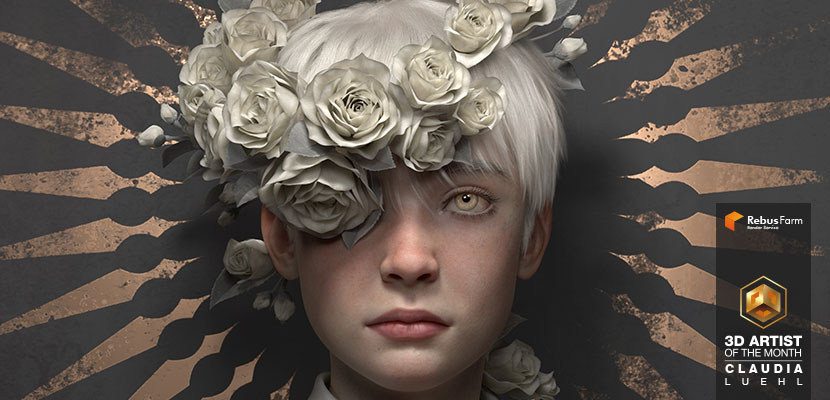
While beauty undoubtedly lies in the eye of the beholder, it is usually understood to mean "pleasing to our aesthetic sensibilities". To Claudia Lühl, our March 2022 3D Artist of the Month, beauty is particularly pleasing when it is complemented and contrasted with darker undertones. Crowning her recent graduation from the renowned Gnomon School of Visual Effects, Games and Animation, the 3D character artist reinterpreted a concept of a young child holding a lamb. A second glance at this seemingly perfect depiction of 'Innocence', however, reveals something unsettling lurking beneath the surface…
Join us, as Claudia dives deep into the creation of her latest project, talks about the hardships of studying during the pandemic, and her affinity for disquieting beauty.
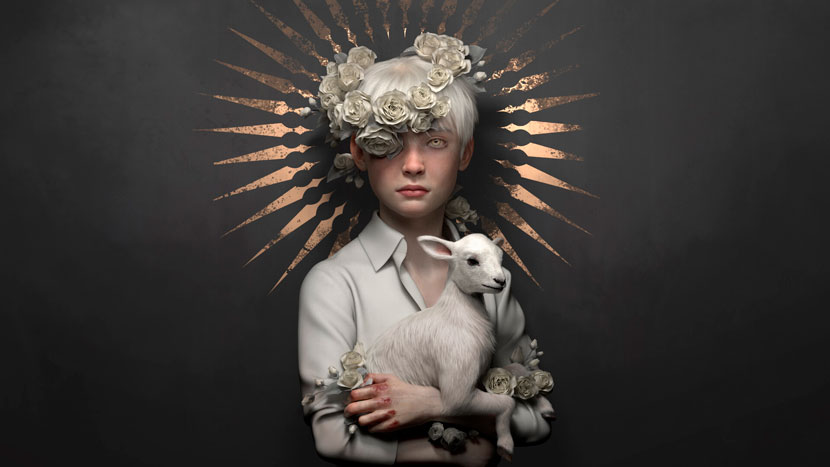 Claudia Lühl, 'Innocence'.
Claudia Lühl, 'Innocence'.
Hi Claudia, thanks for joining us! To start things off, please introduce yourself to our readers.
Hi there, thank you for this opportunity! My name is Claudia Lühl, I am a 27-year-old character artist from Germany and a recent graduate from the Gnomon School of Visual Effects.
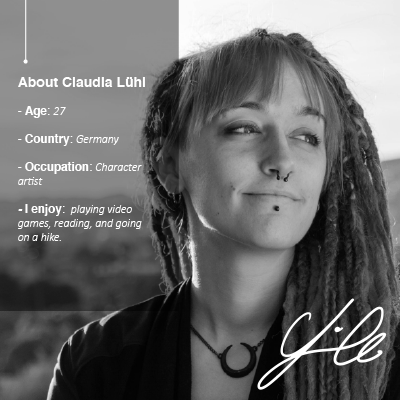
Do you recall when and how you first consciously encountered CGI?
It was during my teenage years when my friend introduced me to the video game 'Dragon Age: Origins'. I had not played many video games before, so I was absolutely fascinated by it! I began researching how video games are made and learned about the artistic process, from 2D concepts, over 3D modeling to the final product. That was when I finally realized that working on video games was an actual career option.
When did you then decide to pursue such a career yourself?
After finishing high school in 2014, I decided to study Game Design at the Mediadesign Hochschule in Berlin. Initially, I planned on becoming a concept artist, as I had always loved drawing. But then I worked on my first character in ZBrush for a class project, and discovered I loved that even more! Since then, I have focused my studies on 3D software and character modeling.
What training or education do you have?
I have a Bachelor of Science from my aforementioned studies. Following my graduation in 2018, I started working as a 3D character artist at HandyGames, a game development studio that is part of THQ Nordic and Embracer Group. During my time there, I had the chance to work on titles such as 'Townsmen VR' and 'Stunt Kite Party'.
However, I wanted to further educate myself, and so I enrolled in the two-year program at Gnomon School of Visual Effects, Games and Animation, with a focus on modeling and texturing. I received my certificate in digital production in September of last year.
As a recent graduate from Gnomon, please tell us more about your studies, the school community, and your overall experience!
It was great, but also very sad at the same time...You see, I was so excited when I started the program in October 2019: for years, I had dreamed of going to this school, and finally being there, surrounded by so many other artists, was an absolutely amazing experience! But then, COVID happened, the campus closed, and all classes were moved online. It was all very confusing and frustrating. The school did its best to accommodate and provide a good learning experience, and the instructors were all doing an amazing job, but of course, it was not the same as being on campus. In the end, I spent six of my eight terms online, and just as my last class wrapped up, the campus reopened. The timing could not have been any worse!
Still, I was lucky to have spent my first terms on campus and thus had the chance to get to know my fellow students in person, so we were already very close when the lockdown happened, and we stayed in touch during the pandemic. We made good use of the school’s Discord server, where we had digital lab rooms to hang out and ask for help and feedback for our projects. So even when we were not able to meet in person, we still had a chance to spend time together and learn from each other, which is what makes Gnomon so special in my opinion.
Of course, the courses themselves were great! From hard surface modeling, over props and weapons to characters, I learned a lot about modeling and texturing. Regrets aside, I am really happy how my work has improved over these past two years.
What unfortunate timing! Especially considering you decided to leave your home country and relocate to Los Angeles, California for your studies. Can you tell us about that move? How do you enjoy living abroad?
Even though I loved my job at the time, I still dreamed about working on epic titles like 'The Witcher 3', 'God of War', and the 'Mass Effect series', games I loved playing myself and which inspired me to become an artist in the first place. But to get to that level, I still had to learn a lot. When I looked up dedicated media and entertainment schools and found most of them to be either in the U.S. or Canada.
So, after some deliberation, I decided to take a leap of faith: I quit my job, moved to L.A., and enrolled at Gnomon – and I loved it! It was a great experience, working with so many artists from all over the world, all sharing my passion. I really enjoyed the city as well; it is an interesting place and I love the coast, and above all, the weather.
Having lived in both Germany and the U.S., how does the CG scene in your home country fare in comparison?
There are just so many more opportunities! Compared to the U.S., the German games industry is really small, with very few larger studios working on AAA games. This is why I was that more thrilled when I arrived in L.A., with so many amazing studios one next to another!
With your training complete, what is next for you career-wise?
Ha, that is kind of a bitter pill to swallow. I was really hoping to stay in the U.S. post-graduation, and I was already talking to some really amazing studios who had reached out to me and wanted me on their team. But as it turns out, it is pretty much impossible for me to obtain a working visa, as I would first need a sponsor, which is hard enough already to find in my position. Even then, it would still come down to sheer luck, since the application process is based on a lottery system. It is all very frustrating!
So, I am going back to Europe, where I do not need to worry about a visa anymore. I am currently in talks with several studios, and hope to land a job as a character artist very soon!
Do you have any long-term goals? Do you have a dream job, whether it's a specific position or a certain company you admire?
I still hope to return to Los Angeles at some point. I fell in love with the city, and made great friends here – not to mention the job opportunities. Hopefully, the pandemic eventually blows over things return to normal until then. Besides that, I really hope to work on cinematic trailers one day, since the combination of high-quality artwork and great storytelling has always amazed me. Oh, and BioWare is definitely a company close to my heart!
Describe your profile as a CG artist! What are your main areas of expertise?
My main focus is on characters for games and cinematics. In the last few years, I have worked on a range of different projects, including a VR game for which I made low poly characters and was responsible for concepts, modeling, texturing, rigging, and animating. I have also done some real-time characters for games, creating high-resolution models in ZBrush, then baking the details from the high poly mesh to a low poly retopo. My most recent projects involved high-res cinematic characters with more complex UVs and multiple UDIMs, with grooming done in XGen and all rendered in V-Ray.
Are there specific design principles or schools of thought you adhere to? What or who inspires you as a 3D artist?
Art that inspires me is often a mix of something beautiful with a slightly dark or creepy twist. I have always admired gothic designs, and I love the unique aesthetic of games like 'Dark Souls' and 'Bloodborne'. For paintings, I enjoy interesting compositions and majestic or dreamlike atmospheres.
Incidentally, this is also the reason why I generally prefer to work from paintings rather than concepts: as a character artist, I am often building characters that have a very specific function within their respective games, and the designs are almost always based on someone else’s concept. This is fun, but also quite limiting to my own creativity. So, for my personal projects, I look for more than a skillfully displayed model. I want to create more encompassing, atmospheric pieces.
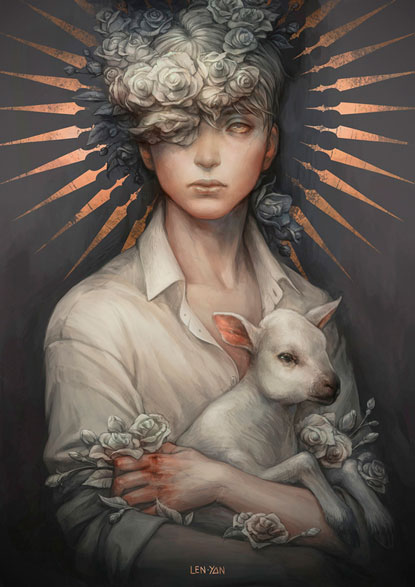 |
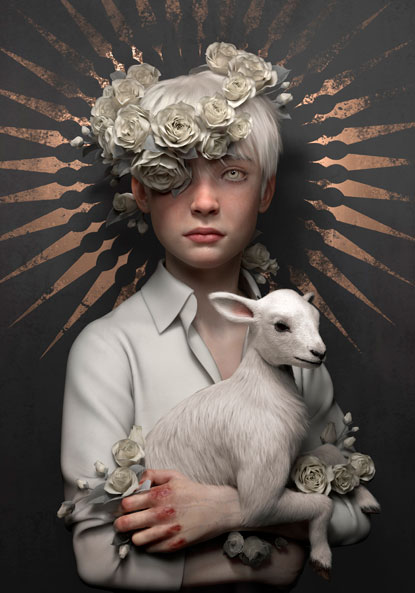 |
From 2D to 3D: for her final project at Gnomon, Claudia recreated an original artwork by Magdalena Pagowska.
Let us talk about your work in more detail, namely 'Innocence', your 3D reimagining of a 2D character by concept artist Magdalena Pagowska. Can you first tell us a bit more about the origins of the project? Was this part of a school assignment or a personal project?
A little bit of both, I'd say, as this project was done after I had already graduated. Gnomon is offering an additional free-of-charge class to every graduate; I picked the advanced 'Texturing 4' class, which focuses on skin texturing and look development. I had already completed this class as part of my regular curriculum, but since it is so essential for my work, I wanted to take it again. For my second time around, I decided to tackle a more complex project and specifically work on the parts I had struggled with in the past.
What attracted you to the original artwork?
I was fascinated by the contrast and composition of this piece. The juxtaposition of the innocence of the boy with his lamb, and the bloody knuckles and lifeless skin – it is so beautiful and, at the same time, bizarre and disturbing. The title adds to this, too, it all just works so well together. I love Magdalena Pagosa’s work, her pieces and designs are always very pretty, yet dark.
Another, maybe more technical reason I chose this piece was to expand my portfolio. I had not made a child before, and children are generally difficult to make because their skin and features are so much softer than adults. Modeling and grooming a realistic sheep also posed quite the challenge, but I wanted to become more confident in XGen. Overall, this piece was a great fit both from an artistic and technical perspective.
Speaking of challenges: what were some you had to overcome and how long did it take you to complete the project?
The grooming of the lamb, for sure. I wanted to create a noisy, yet soft look. The roses were also a bit tricky because roses are quite complex and take a lot of time to model. Due to the grooming and subsurface scattering of the skin and roses, the scene grew rather heavy and therefore took a long time to render. Even a test render was so demanding I could not use my PC for anything else for hours. I tried to finish this piece within the remaining ten weeks of the term, but I ended up needing another week to polish the groom.
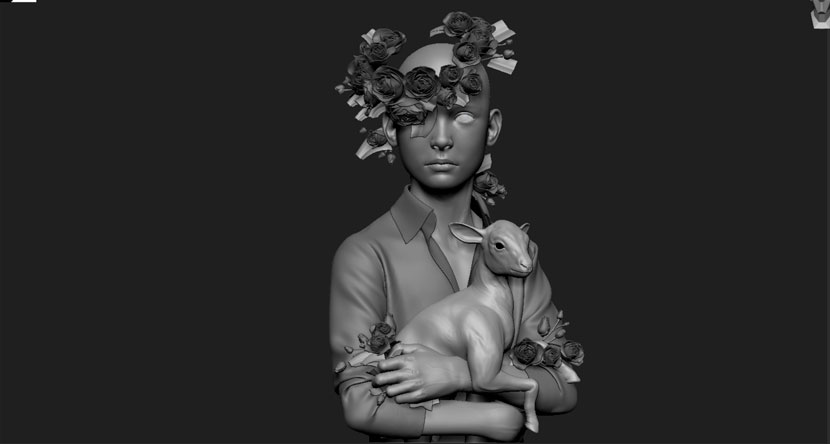 The ZBrush model of the boy and his lamb.
The ZBrush model of the boy and his lamb.
While the character in the original illustration could be considered a youth, it seems your version has much more pronounced child-like features.
This was a deliberate choice on my side. Every element of this piece adheres to this holy and innocent aesthetic: the crown of white roses, the lamb, and the golden halo; it all adds to the boy's saint-like appearance. Which then is heavily contrasted by the bloody knuckles. I thought I could further increase this contrast by making the boy a bit younger since childhood is commonly linked with purity and innocence.
Are there other parts of the model where you deviated from the original?
I had to slightly change the overall composition in regards to the position of the lamb. Since the proportions of a boy and a teenager are very different, it was impossible to keep the composition exactly as in the concept. I had to improvise and see what composition worked best.
Generally speaking, how much creative liberty do you grant yourself when working on a 2D reference? Or do you prefer to be as faithful to the original artwork as possible?
I usually try to stay close to the concept, but that can be difficult, as some things do not translate perfectly to 3D. For example, the anatomy and perspective in the painting look nice in 2D, but when blocking out my scene I noticed that they were not correct or realistic. Our instructors advised us to always aim to improve upon the concept, so every time I am confronted with this decision, I look for ways to do so.
How did you go about transposing the 2D sketch into a 3D model? Can you walk us through the production process step by step?
Sure! I started with a base mesh available to all Gnomon students. It was a female mesh, so I had to make a few topology changes and edit the proportions in Maya. After that, I started sculpting the primary and secondary details in ZBrush; the sheep I build in ZBrush as well. I first built a simple skeleton to get a feeling for the volume and proportions, having some anatomy references up on a second monitor. Next, I added the body around it by using the Mesh Balloon Tool, which allowed me to create shapes from thin air, very quickly and accurately.
Once I was happy with the mesh, I started posing the boy and lamb in ZBrush using the Transpose Master. I liked using layers because it allowed me to experiment with different poses without permanently deforming my mesh. The skin texturing was done in Mari, since, in my opinion, it is the best program for skin texturing and adding all these very fine details. It allows projection-painting even very heavy texture files, and the Node Graph makes it easy to organize even complex scenes. I used Texturing XYZ displacement maps for smaller skin details like pores, and projection painted them onto the model.
Then, I imported these displacement maps into Maya and created the displacement shader in V-Ray. The shirt I created in Marvelous Designer, includes the nice and realistic wrinkles in the fabric. I started building the shirt around the boy model in T-pose and then imported the posed model as a blend shape, so the fabric could be simulated around it accurately. A great plug-in I used for making a retopo of the high-resolution shirt while keeping the already created UVs was jQuadCloth by Jacopo Ortolani.
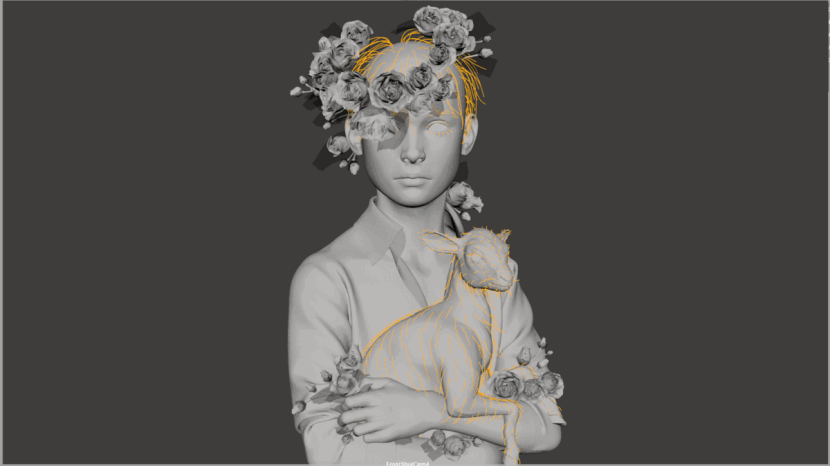 From base model to groom: the hair guides indicate the length and direction of the hair and fur.
From base model to groom: the hair guides indicate the length and direction of the hair and fur.
For the roses, I wanted to work with real-life references, so I bought some roses and analyzed how the petals are formed and arranged. I also took some close-up photographs of the petals to use for texturing later on. Only for the leaves, I resorted to premade textures from Quixel Megascans. Once I had one rose done, I brought it into ZBrush, duplicated it a few times, and started arranging them around the model, trying to stay as close to the concept as possible. I manually added more variety and imperfections, since realistic flowers are neither identical nor perfect.
Using XGen in Maya, I next added the hair of the boy and the fur of the lamb. I started by adding the hair guides that would set the overall length and direction of the hair, then added different modifiers to create effects like noise, curls, and clumps. A tutorial that I found immensely helpful is the one from Liam Drain on YouTube. When working in XGen, Maya frequently crashed, since it has trouble working with PTEX files when creating hair maps. But in this tutorial, I learned how to use PNG files instead, thus preventing Maya from crashing. That really improved my workflow!
Once I was happy with how everything looked, I rendered the image in V-Ray. I made sure to set up my different render passes, so I could use them later for editing my composition in Nuke, where I also added some small changes like color correction.
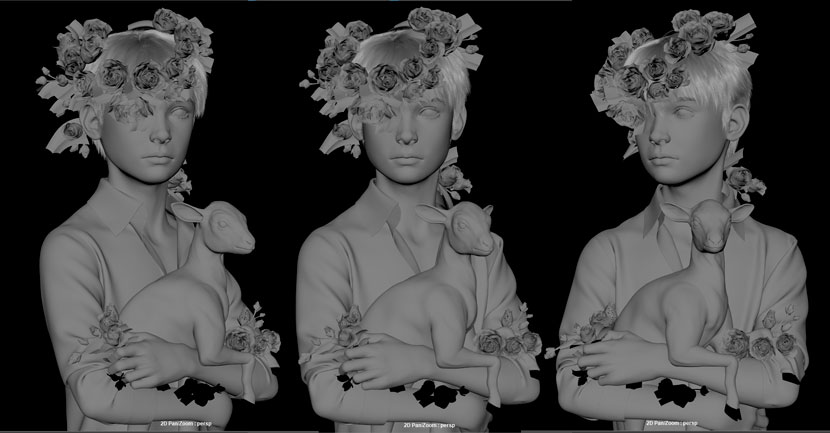 A turnaround showing the model from different angles.
A turnaround showing the model from different angles.
What has the feedback been like so far and how satisfied are you with the results yourself?
It has been surprisingly good! Just being here as your 3D Artist of the Month is equally unexpected and amazing; it is something I had hoped for, of course, but I thought my chances were rather low. Another personal highlight for me was my work making it into the trending section on ArtStation. I remember browsing that section a few years ago, thinking how great it would be if I could see my own work up there one day, so actually making it is a big deal to me! I also got positive feedback from several recruiters, who said that my choice of more artistic pieces made my portfolio stand out. I am happy it was so well received!
Have you used RebusFarm before? If so, please tell us about your overall experience. Is there anything you especially like about our service?
Yes, I used it for one of my class projects when the campus was closed and I did not have access to another PC to render. I used RebusFarm for a very heavy scene, it worked very well!
In closing, is there anything else you want to say? Any plugs, shoutouts or upcoming projects you would like to mention?
Just that I am very grateful for all the help and feedback from my instructors and other students I met at Gnomon, helping me become a better artist. And my family, they do not really understand what I am doing, but they are so sweet and always had my back. Finally, thank you very much for choosing me as your 3D Artist of the Month! I will make good use of the RenderPoints for my next project.
The pleasure is all ours and we cannot wait to see what you have in store for us! Claudia, thank you very much for taking the time and all the best in the future.
---
Keep up with Claudia Lühl and her work here:
HOW TO JOIN OUR MONTHLY CONTEST
Do you want to be our next featured 3D Artist of the Month and win 250 RenderPoints? Just visit our 3D Artist of the Month competition page and submit your entry. We'll choose the best image and contact the winner.
>> Read more articles on our blog
